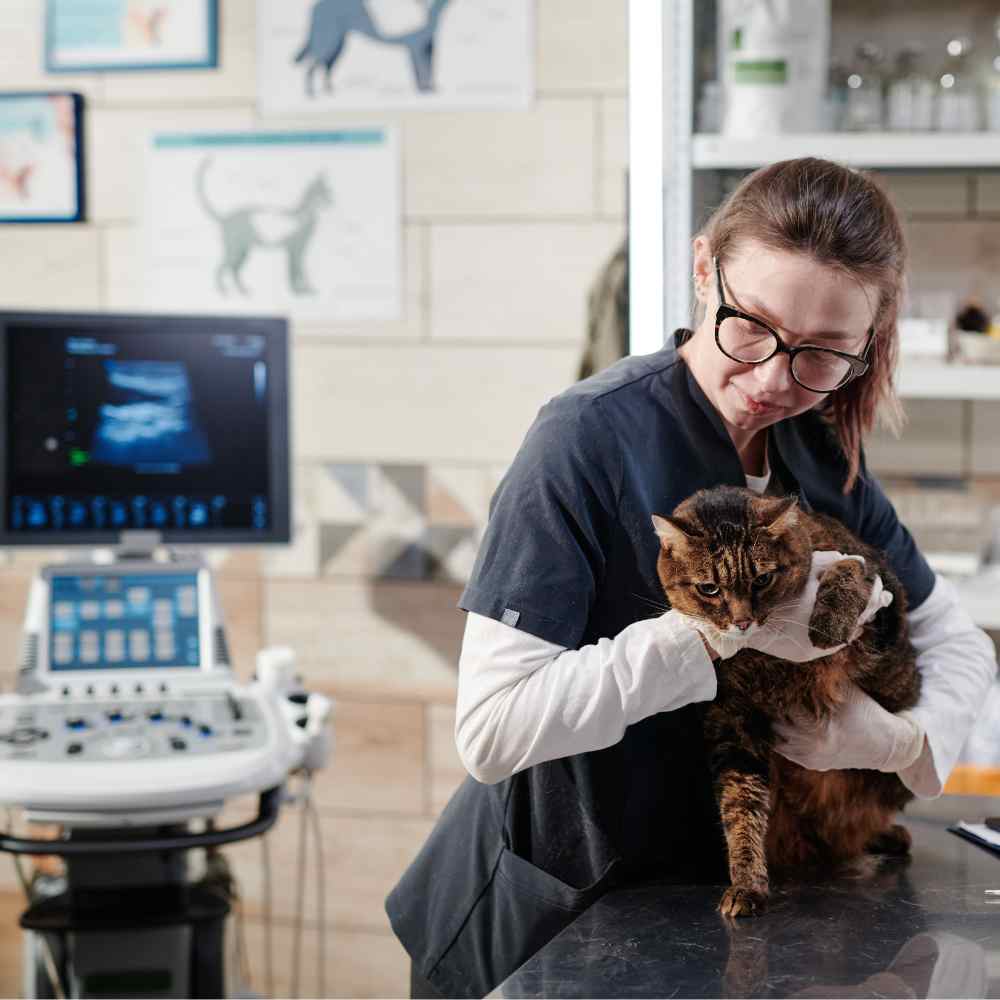Most Common Emergencies That Can Affect Your Pets
Pet emergencies can happen suddenly and often require immediate veterinary care.


Difficulty Breathing
Choking: Pets may choke on food, toys, or other objects.
Respiratory Distress: Signs such as shortness of breath, gasping, wheezing, or labored breathing can indicate blockages, infections, or heart/lung issues.

Bloat (Gastric Dilatation and Volvulus)
Abdominal Swelling: This life-threatening condition, especially in large dog breeds, involves the stomach twisting and trapping gas, requiring emergency surgery.

Unconsciousness or Unresponsiveness
Shock or Seizures: Unconsciousness, collapse, or unresponsiveness may be due to severe illness, trauma, or poisoning.

Signs of Pain
Crying, Whining, or Hiding: These behaviors may indicate your pet is in pain and requires urgent assessment.

Bleeding
Internal or External: Continuous or heavy bleeding from the mouth, nose, or rectum may indicate internal injuries, poisoning, or other severe conditions.

Labor Complications in Pregnant Pets
Dystocia (Difficult Labor): If a pet is struggling during delivery or showing signs of distress, it’s an emergency that needs immediate attention.

Severe Vomiting or Diarrhea
Dehydration: Persistent vomiting or diarrhea can cause dehydration, which needs prompt treatment.
Gastrointestinal Blockages: Swallowed foreign objects can block the intestines, leading to vomiting, lethargy, and abdominal pain.
Below are some of the most common emergencies that may affect pets:

Trauma or Injury
Car Accidents: Pets hit by vehicles can suffer from fractures, internal bleeding, and chest or head injuries.
Falls or Severe Bites: High falls, bites from other animals, or blunt trauma can result in serious injury.
Severe Lacerations: Deep cuts that lead to significant blood loss.

Ingestion of Toxic Substances
Poisons: Substances like antifreeze, rat poison, slug bait, household cleaners, or toxic plants (e.g., karaka berries) can be harmful.
Human Medications: Common medications like ibuprofen or paracetamol can be toxic to pets.
Dangerous Foods: Foods such as chocolate, grapes, raisins, and onions can cause poisoning.

Seizures or Neurological Issues
Seizures: Sudden tremors, convulsions, or shaking can be a sign of epilepsy, poisoning, or an underlying condition.
Head Trauma: Head injuries may cause loss of consciousness or confusion.

Allergic Reactions
Severe Swelling or Hives: Reactions to insect bites, vaccines, or medications may cause severe swelling, breathing difficulties, or hives.

Eye Injuries
Scratches or Chemical Exposure: Eye injuries, including scratches or exposure to harmful chemicals, require urgent care to prevent deterioration.


Heatstroke
Overheating: Pets in hot environments, such as cars, can develop heatstroke. Symptoms include excessive panting, drooling, weakness, or collapse.

Difficulty Urinating or Not Urinating
Urinary Blockages: Common in male cats, a blocked urinary tract is a medical emergency and can be fatal without immediate care.

Walking Problems
Dragging Legs or Inability to Stand: Difficulty walking, staggering, or leg dragging can signal trauma, spinal issues, poisoning, or blood clots.
Non-Weight Bearing: Refusing to put weight on a leg can indicate trauma, infection, or joint problems.
Below are some of the most common emergencies that may affect pets:

Trauma or Injury
Car Accidents: Pets hit by vehicles can suffer from fractures, internal bleeding, and chest or head injuries.
Falls or Severe Bites: High falls, bites from other animals, or blunt trauma can result in serious injury.
Severe Lacerations: Deep cuts that lead to significant blood loss.
Ingestion of Toxic Substances
Poisons: Substances like antifreeze, rat poison, slug bait, household cleaners, or toxic plants (e.g., karaka berries) can be harmful.
Human Medications: Common medications like ibuprofen or paracetamol can be toxic to pets.
Dangerous Foods: Foods such as chocolate, grapes, raisins, and onions can cause poisoning.
Seizures or Neurological Issues
Seizures: Sudden tremors, convulsions, or shaking can be a sign of epilepsy, poisoning, or an underlying condition.
Head Trauma: Head injuries may cause loss of consciousness or confusion.
Allergic Reactions
Severe Swelling or Hives: Reactions to insect bites, vaccines, or medications may cause severe swelling, breathing difficulties, or hives.
Eye Injuries
Scratches or Chemical Exposure: Eye injuries, including scratches or exposure to harmful chemicals, require urgent care to prevent deterioration.

Heatstroke
Overheating: Pets in hot environments, such as cars, can develop heatstroke. Symptoms include excessive panting, drooling, weakness, or collapse.
Difficulty Urinating or Not Urinating
Urinary Blockages: Common in male cats, a blocked urinary tract is a medical emergency and can be fatal without immediate care.
Walking Problems
Dragging Legs or Inability to Stand: Difficulty walking, staggering, or leg dragging can signal trauma, spinal issues, poisoning, or blood clots.
Non-Weight Bearing: Refusing to put weight on a leg can indicate trauma, infection, or joint problems.
Difficulty Breathing
Choking: Pets may choke on food, toys, or other objects.
Respiratory Distress: Signs such as shortness of breath, gasping, wheezing, or labored breathing can indicate blockages, infections, or heart/lung issues.
Bloat (Gastric Dilatation and Volvulus)
Abdominal Swelling: This life-threatening condition, especially in large dog breeds, involves the stomach twisting and trapping gas, requiring emergency surgery.
Unconsciousness or Unresponsiveness
Shock or Seizures: Unconsciousness, collapse, or unresponsiveness may be due to severe illness, trauma, or poisoning.
Signs of Pain
Crying, Whining, or Hiding: These behaviors may indicate your pet is in pain and requires urgent assessment.
Bleeding
Internal or External: Continuous or heavy bleeding from the mouth, nose, or rectum may indicate internal injuries, poisoning, or other severe conditions.
Labor Complications in Pregnant Pets
Dystocia (Difficult Labor): If a pet is struggling during delivery or showing signs of distress, it’s an emergency that needs immediate attention.
Severe Vomiting or Diarrhea
Dehydration: Persistent vomiting or diarrhea can cause dehydration, which needs prompt treatment.
Gastrointestinal Blockages: Swallowed foreign objects can block the intestines, leading to vomiting, lethargy, and abdominal pain.
Take Action: Contact our Veterinarian for Immediate Guidance
Recognizing the signs of a pet emergency and acting quickly can significantly improve outcomes for your furry friend. If you’re unsure whether your pet is facing an emergency, it’s always better to err on the side of caution—if you are in Wellington contact us right away for guidance. Your prompt action can make all the difference in their care.
 CALL US NOW | 04 473 7545
CALL US NOW | 04 473 7545


